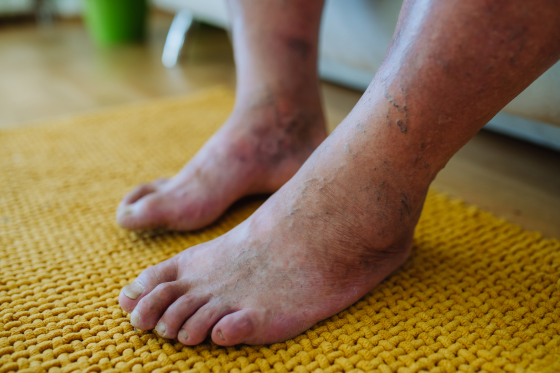Neuropathy is a condition that often hides in plain sight. Many people know it for its common symptoms—tingling, numbness, or burning sensations in the hands or feet—but few realize just how deeply it can affect a person’s life beyond the obvious. The truth is, neuropathy doesn’t just impact nerves. It can quietly disrupt mobility, sleep, independence, and even emotional well-being.
In this blog, we’ll break down the underlying issues neuropathy causes, many of which often go unrecognized. Whether you’re living with neuropathy, supporting someone who is, or simply trying to better understand the condition, this guide will give you insight into how neuropathy affects the body, the mind, and everyday life.
What Is Neuropathy, Really?
Peripheral neuropathy refers to damage or dysfunction of the peripheral nerves—those outside of the brain and spinal cord. These nerves help send messages between the brain and the rest of the body. When they’re impaired, the messages become jumbled or completely blocked.
There are many causes of neuropathy, including:
- Diabetes (one of the most common)
- Autoimmune diseases
- Injuries or trauma
- Chemotherapy or medications
- Infections
- Vitamin deficiencies
- Alcohol abuse
But while the causes may vary, the effects often share a similar pattern—and go far deeper than what we feel on the surface.
1. Limited Mobility and Balance
One of the most immediate challenges neuropathy brings is impaired mobility. When you can’t feel your feet properly, walking becomes difficult. You may feel unsure of your footing, or even unaware of where your feet are in space—a condition known as proprioceptive loss.
This can cause:
- Trouble walking for long distances
- Difficulty navigating stairs
- Fear of tripping or falling
- Poor balance and increased risk of falls
Many people subconsciously begin to limit their activity, which can lead to muscle deconditioning and further loss of mobility.
2. Sleep Disturbances
Neuropathy doesn’t clock out at bedtime. In fact, for many people, nerve-related discomfort worsens at night, making it hard to fall or stay asleep.
Common reasons for this include:
- Fewer distractions at night, making symptoms feel more intense
- Blood sugar fluctuations in diabetic neuropathy
- Heightened sensitivity when resting
Over time, poor sleep quality leads to fatigue, foggy thinking, and a weakened immune response—amplifying the effects of neuropathy and reducing quality of life.
3. Emotional and Mental Health Strain
Chronic health conditions like neuropathy are not just physical—they’re emotionally exhausting. When daily activities become a challenge and comfort feels out of reach, it’s normal to feel discouraged.
Many people with neuropathy experience:
- Anxiety, especially around falling or movement
- Depression, linked to reduced independence or social withdrawal
- Frustration, when symptoms don’t improve or are misunderstood
- Isolation, due to limited ability to enjoy activities or hobbies
Mental health is a critical but often overlooked component of neuropathy care. Support, counseling, and education are essential in addressing this aspect of the condition.
4. Muscle Weakness and Atrophy
Over time, limited use of affected limbs—whether due to pain or numbness—can lead to muscle wasting, especially in the legs and feet.
This can show up as:
- A visible decrease in muscle size or tone
- Trouble lifting your feet (known as “foot drop”)
- Difficulty rising from chairs or walking uphill
- Reduced physical endurance
Muscle weakness not only impacts independence but also increases the risk of injury. It becomes a cycle: the less someone moves, the weaker they become, and the harder movement becomes.
5. Skin and Foot Health Complications
Neuropathy doesn’t just dull sensation—it also disrupts the body’s ability to detect injury or infection. When combined with poor circulation (common in diabetes), this can lead to serious skin issues, particularly on the feet.
Common concerns include:
- Ulcers or sores that go unnoticed
- Infections that don’t heal properly
- Increased risk of amputation in severe cases
Regular skin checks, proper footwear, and working with a specialist are all important parts of preventing these complications.
6. Digestive and Organ Function Challenges
Some forms of neuropathy, especially autonomic neuropathy, can affect nerves that control internal organs. This can result in:
- Bloating, constipation, or diarrhea
- Irregular heart rate or blood pressure
- Difficulty swallowing or digesting food
- Problems with bladder control
Because these symptoms are often subtle or attributed to other causes, they can go undetected for a long time.
7. Lifestyle Disruptions and Dependency
The cumulative effect of these underlying issues can lead to a loss of independence. Tasks that were once routine—cooking, driving, walking the dog—may become daunting or require assistance.
This shift can result in:
- Reliance on family members or caregivers
- Financial strain from ongoing medical care
- Difficulty maintaining employment
- A sense of loss around identity and autonomy
While everyone’s journey is different, the impact neuropathy can have on daily life is real and often underestimated.
Why Awareness and Early Action Matter
One of the biggest challenges with neuropathy is that many people wait too long to seek help. They assume their symptoms are just a part of aging or something they have to live with.
But that doesn’t have to be the case.
By recognizing the broader impact neuropathy has on physical and emotional health, individuals and providers alike can work together to manage the condition more effectively.
This may include:
- Lifestyle and dietary changes
- Supervised exercise programs
- Targeted therapies like Stimpod or red light therapy
- Education on safe movement and foot care
- Emotional and mental health support
Early education and intervention can help preserve independence, support mental well-being, and maintain quality of life for longer.
Final Thoughts
Neuropathy is far more than just tingling in the toes. It’s a condition that can subtly, but significantly, influence almost every aspect of a person’s life. From mobility and balance to sleep and self-confidence, the underlying issues caused by neuropathy deserve attention and action.
At MORGAiN Physical Therapy, we’re committed to helping individuals better understand their bodies and take proactive steps toward better function and quality of life. Whether you’re newly diagnosed or navigating long-term symptoms, know this: support, movement, and education are key—and you don’t have to face it alone.

